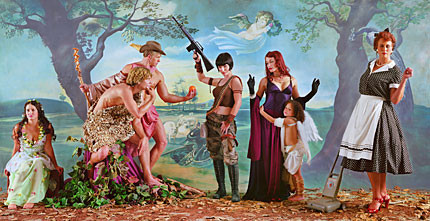
El juicio de Paris, Eleanor Antin, 2007
Characters:
Date of production: 2007
Types of works
Audiovisual
Graphic work
Genres
Art > Painting
Art > Sculpture
Art > Photography
Art > Drawing
Art > Performance
Art > Installation
Socio-cultural movements
Late modern period / Contemporary period > Feminism

El juicio de Paris, Eleanor Antin, 2007
La fotografía El juicio de Paris (según Rubens) – Dark Helen forma parte de un trabajo perteneciente a la serie Odisea de Helena, del año 2007. Tiene otra versión titulada El juicio de Paris (según Rubens) – Light Helen. La fotografía se incluyó en la gran exposición del British Museum de Londres “Troya: mito y realidad”, celebrada del 21-11-2019 al 08-03-2020.
Desde 2001, ha completado tres series de fotografías alegóricas basadas en la vida romana: Los últimos días de Pompeya, Alegorías romanas y Odisea de Helena.
La autora explica en una entrevista el motivo de sus series fotográficas:
“Toda mi vida he tenido una pasión por la antigua Grecia, desde que leí la Mitología de Bulfinch cuando era niña. Al leerlo por primera vez, deseé poder vivir en la antigua Grecia. Pero luego, más tarde, cuando me enteré de lo mal que trataban a las mujeres, hice un poco de trampa y cambié mi lealtad a la antigua Roma, donde las mujeres tenían algunos derechos e incluso podrían haber vivido vidas interesantes…”.
“Helena siempre es vilipendiada como una seductora y admirada por su belleza y temida por su poder; sin embargo, sea como sea que se la interprete, su lugar en nuestra fantasía histórica siempre ha sido legitimado, escrito o pintado por hombres. Quería humanizar a esta mujer, encontrarla bajo la cubierta de historias que nos la oscurecen.”
Sholis, Brian (2008). “Eleanor Antin discusses her recent photographic series”, Artforum, (consultado el 14/05/2021). < https://www.artforum.com/interviews/eleanor-antin-discusses-her-recent-photographic-series-20824 >
En los años 70 comienza a florecer una nueva ola feminista que afectará al ámbito teórico y universitario y al movimiento artístico.
Miriam Schapiro crea la categoría femmage, un estilo de collage que utiliza materiales, objetos y técnicas artesanales identificadas culturalmente con la mujer
Judy Chicago realiza su obra The Dinner Party, una mesa ceremonial. En cada lado de la mesa triangular dispone 13 servicios con cerámicas, manteles bordados y los nombres de las 39 invitadas, entre ellas Safo, Aspasia, Teodora e Hipatia. En los azulejos blancos donde se asienta la mesa están inscritos los nombres de otras 999 mujeres que incluyen a Erina, Cleobulina, Teano, Julia Domna, Clodia…
También Eleanor Antin dinamita, con fina ironía, las construcciones idealizadas de feminidad en los imaginarios que el mundo clásico ha trasladado hasta nuestros días.
-CUC: Bloque Continuidad del patrimonio cultural. Mitología y religión.
-Latín 4º ESO: Bloque Legado y patrimonio.
(En las anteriores asignaturas, se podrán utilizar las obras fotográficas relacionadas con la mitología clásica)
-Historia del Arte 2º Bachillerato: se puede tratar el conjunto de su obra.